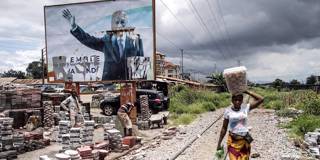The democratization push in Africa’s poorest countries has failed to produce legitimate governments capable of delivering security and development, and the increasing frequency of military coups should trigger a rethink. Where institutions are weak, elections alone will not make leaders accountable.
ABIDJAN – At the end of the 1980s, political liberalization swept across Africa, seemingly indicating that it was the continent’s turn to embark on history’s inexorable march toward democracy. Some commentators argued that, by increasing the legitimacy of African governments, political reform contributed to the subsequent decline in military coups.
But since the start of 2021, a string of military takeovers in West and Central Africa – in Chad, Mali, Guinea, and Burkina Faso, as well as a recent attempted coup in Guinea-Bissau – has seemingly turned back the clock. International and regional organizations routinely advocate democratization and condemn coups. But recent developments should prompt reflection about whether touting democratization as the sole solution for fragile states is sufficient.
In particular, the spate of recent coups highlights the fragility of democratization in countries that are at an early stage of economic development and, perhaps more importantly, face major security challenges.

ABIDJAN – At the end of the 1980s, political liberalization swept across Africa, seemingly indicating that it was the continent’s turn to embark on history’s inexorable march toward democracy. Some commentators argued that, by increasing the legitimacy of African governments, political reform contributed to the subsequent decline in military coups.
But since the start of 2021, a string of military takeovers in West and Central Africa – in Chad, Mali, Guinea, and Burkina Faso, as well as a recent attempted coup in Guinea-Bissau – has seemingly turned back the clock. International and regional organizations routinely advocate democratization and condemn coups. But recent developments should prompt reflection about whether touting democratization as the sole solution for fragile states is sufficient.
In particular, the spate of recent coups highlights the fragility of democratization in countries that are at an early stage of economic development and, perhaps more importantly, face major security challenges.